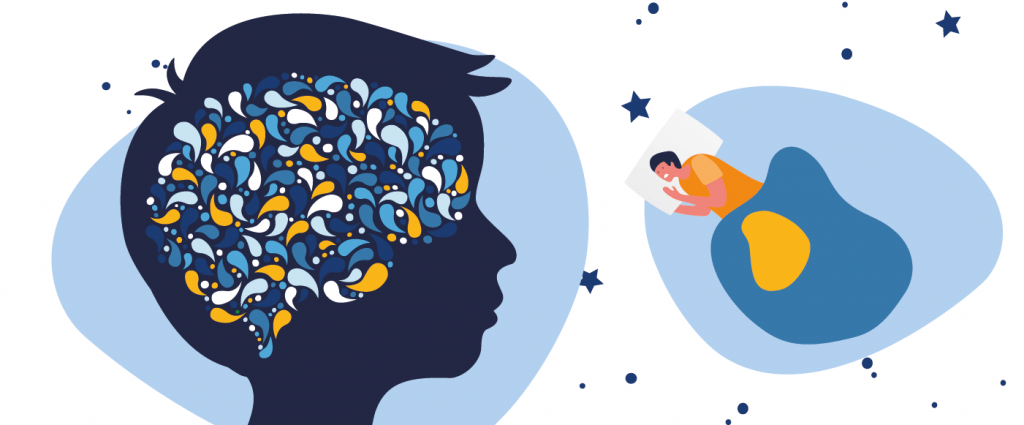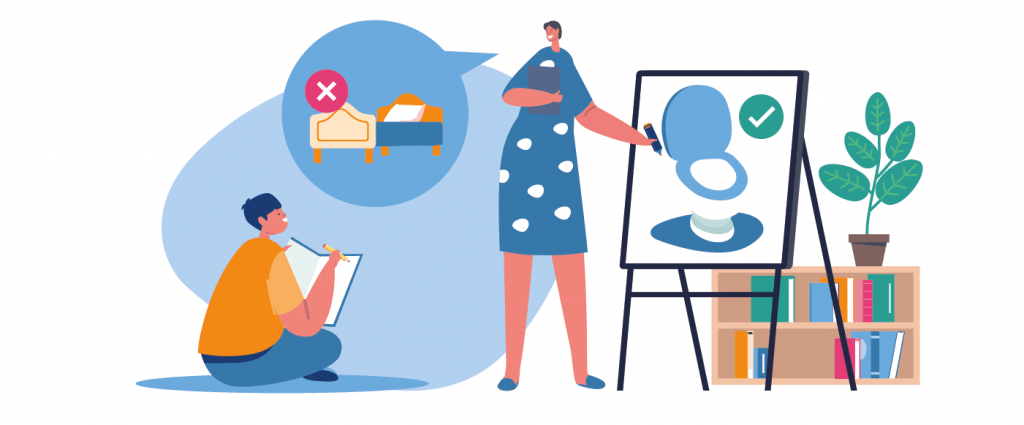What are the psychological causes of bedwetting in young people?
Bedwetting can be very upsetting and awkward for children and teens, particularly as they get older. Nonetheless, this condition, also known as nocturnal incontinence, is relatively common, occurring in 12% to 25% of four-year-olds, 7% to 10% of eight-year-olds and 2% to 3% of 12-year-olds1. Even teenagers may wet the bed, affecting 1% to 3%2.
Despite its prevalence, the causes of bedwetting in young people (including psychological causes) aren’t widely understood by the general population. We want to smash this taboo, so we’ve gathered all the facts on this condition and some handy tips for its management.

Psychological causes of bedwetting in kids and teens
While parents expect their toddlers and younger children to wet the bed while toilet training, it can be confusing and even concerning if this continues past that stage. Although most children and young people grow out of it3 (only 1% to 2% of adults experience leaks at night4), you can always seek advice from your GP or nurse if you’re concerned.
There are two types of bedwetting in children: primary nocturnal enuresis, where children never achieved dry nights since potty training; and secondary nocturnal enuresis, where a child had achieved dry nights but has regressed5. The latter type of bedwetting is generally linked to a psychological cause, such as a stressful event6.

Being lazy is rarely the reason behind nocturnal enuresis in children7. Instead, though uncommon8, there are psychological causes of bedwetting in children and young people, including:
- attention deficit hyperactivity disorder (ADHD)9
- stress at home or school10, for example, moving house, starting a new school or a bereavement11
- anxiety, which affects the hormone that controls how much wee is produced at night (vasopressin)12
- fear or insecurity.13
Unfortunately, there’s a vicious circle between psychological issues and bedwetting, as nocturnal enuresis can harm a child or young person’s mental health14.
Other reasons behind bedwetting
In addition to psychological causes, some other (potentially more likely) reasons behind bedwetting in kids and teens are:
- genetics; 44% to 70% of children whose parents experienced were enuretic (wet the bed) experience nocturnal incontinence, compared to 15% of children whose parents weren’t
- sleep apnoea15
- a smaller than average bladder
- recurrent urinary tract infections (UTIs)
- developmental delays that may impact toilet training16
- constipation17
- hormonal imbalance; you make antidiuretic hormone (ADH) at night to decrease urine production, but some people may not create enough of this hormone18
- being a deep sleeper, which may stop the child or young person from waking up when they need to wee19.

Managing bedwetting in young people
Don’t worry; there are plenty of management options for bedwetting in young people.
Preventing bedwetting
You can prevent bedwetting from occurring in the first place, by:
- using a bedwetting alarm, which awakens your child as they begin to leak urine. This helps them to recognise when they need to use the toilet
- bladder training; this involves encouraging your child to use the toilet at set times during the day at increasing intervals, which teaches their bladder to hold urine for longer
- rewards to praise dry nights20
- avoiding caffeine and carbonated drinks, which can irritate the bladder
- encouraging your child or teen to use the loo at the beginning of their bedtime routine and again just before they get into bed
- talking to your child about their nocturnal enuresis to avoid shame around this condition
- not talking about your child’s bedwetting to people outside of healthcare professionals to respect their privacy
- discouraging teasing from siblings and other family members21
- ensuring easy access to the bathroom by clearing the path and using night lights.22
Dealing with leaks
Some tips for managing when your child does wet the bed are:
- using appropriate continence products, such as the iD Junior range. This collection provides comfortable, discreet and super absorbing power to allow your child to stay dry overnight
- using mattress protection, such as a waterproof mattress cover or disposable bed pads like iD Protect
- avoiding punishments, as these may make the situation worse23
- in colder months, using two duvets instead of one thicker one, as these can be more easily washed
- sprinkling bicarbonate of soda onto any leaks, which absorbs liquid and neutralises odour
- talking to your GP or health visitor for extra help, including expert advice from an incontinence nurse or free nappies and bed protection.24
If you’d like to learn more about bedwetting in children and other continence issues, we have many useful, expert posts on our blog written with parents in mind.
Sources
1 “Management of nocturnal enuresis – myths and facts”, Rajiv Sinha & Sumantra Raut, 6 July 2016, Source: https://www.ncbi.nlm.nih.gov/pmc/articles/PMC4936340/
2 “What is World Bedwetting Day and why is it important?”, Bladder & Bowel UK, 25 May 2021, Source: https://www.bbuk.org.uk/blog/what-is-world-bedwetting-day-and-why-is-it-important/
3 “Bedwetting in children”, NHS, 27 April 2020, Source: https://www.nhs.uk/conditions/bedwetting/
4 “Bedwetting”, Cleveland Clinic medical professional, 10 October 2019, Source: https://my.clevelandclinic.org/health/diseases/15075-bedwetting
5 “What Is Nocturnal Enuresis (Bedwetting)?”, Urology Care Foundation, n.d., Source: https://www.urologyhealth.org/urologic-conditions/bed-wetting-(enuresis)
6 Ibid.
7 Ibid.
8 “Debunking some common bedwetting myths”, Alina Lynden, n.d., Source: https://www.eric.org.uk/blog/debunking-some-bedwetting-myths
9 “Management of nocturnal enuresis – myths and facts”, Rajiv Sinha & Sumantra Raut, 6 July 2016, Source: https://www.ncbi.nlm.nih.gov/pmc/articles/PMC4936340/
10 “Bedwetting in children”, NHS, 27 April 2020, Source: https://www.nhs.uk/conditions/bedwetting/
11 “Bedwetting”, Cleveland Clinic medical professional, 10 October 2019, Source: https://my.clevelandclinic.org/health/diseases/15075-bedwetting
12 “Debunking some common bedwetting myths”, Alina Lynden, n.d., Source: https://www.eric.org.uk/blog/debunking-some-bedwetting-myths
13 “What Causes Bedwetting?”, Jacquelyn Cafasso, 26 August 2019, Source: https://www.healthline.com/health/bedwetting
14 “Early childhood psychological factors and risk for bedwetting at school age in a UK cohort”, Carol Joinson, Sarah Sullivan, Alexander von Gontard & Jon Heron, 21 August 2015, Source: https://www.ncbi.nlm.nih.gov/pmc/articles/PMC4854940/
15 “Bed Wetting/Enuresis”, LifeStance Health, n.d., Source: https://www.cfpsych.org/condition/bed-wetting-enuresis/
16 “Enuresis in Children”, Amita Schroff, MD, 8 December 2020, Source: https://www.webmd.com/mental-health/enuresis
17 “What Causes Bedwetting?”, Jacquelyn Cafasso, 26 August 2019, Source: https://www.healthline.com/health/bedwetting
18 “What to know about bedwetting”, Beth Sissons, 2 July 2020, Source: https://www.medicalnewstoday.com/articles/bedwetting
19 “Bedwetting”, American Academy of Child and Adolescent Psychiatry, May 2020, Source: https://www.aacap.org/AACAP/Families_and_Youth/Facts_for_Families/FFF-Guide/Bedwetting-018.aspx
20 “Enuresis in Children”, Amita Schroff, MD, 8 December 2020, Source: https://www.webmd.com/mental-health/enuresis
21 “What to know about bedwetting”, Beth Sissons, 2 July 2020, Source: https://www.medicalnewstoday.com/articles/bedwetting
22 “10 tips to control bedwetting in children and adults”, National Association for Continence, n.d., Source: https://www.nafc.org/bhealth-blog/10-tips-to-control-bedwetting-in-children-and-adults
23 “Bedwetting”, American Academy of Child and Adolescent Psychiatry, May 2020, Source: https://www.aacap.org/AACAP/Families_and_Youth/Facts_for_Families/FFF-Guide/Bedwetting-018.aspx24 “Tips on caring for people with learning disabilities – bedwetting”, NT Contributor, 8 July 2011, Source: https://www.nursingtimes.net/archive/tips-on-caring-for-people-with-learning-disabilities-bedwetting-08-07-2011/
